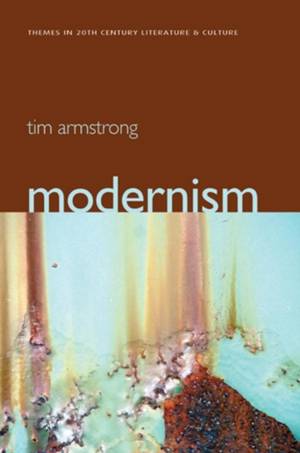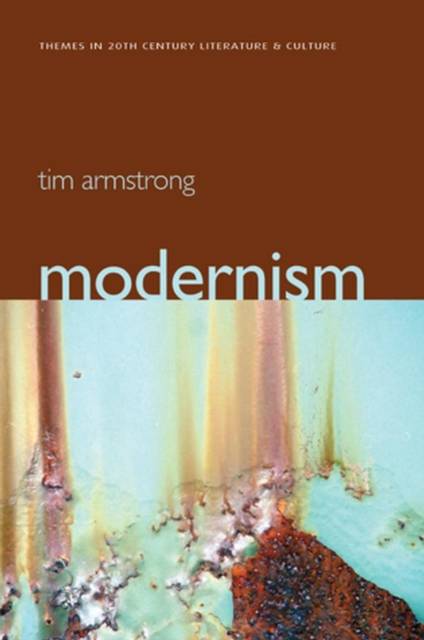
- Afhalen na 1 uur in een winkel met voorraad
- Gratis thuislevering in België vanaf € 30
- Ruim aanbod met 7 miljoen producten
- Afhalen na 1 uur in een winkel met voorraad
- Gratis thuislevering in België vanaf € 30
- Ruim aanbod met 7 miljoen producten
Zoeken
Omschrijving
The last 20 years has seen an explosion of work on literary modernism and its cultural and historical contexts. In this innovative study aimed at a general audience, Tim Armstrong seeks to define modernism not only by its aesthetics and literary genres but also by its links with broader cultural areas in which the 'modern' is implicated and debated, and which inform its representational modes.
Modernism: A Cultural History explores modernism's struggle with a split temporality in which the old and the emerging new struggle, and in which, with the horror of the Great War, notions of a traumatic or 'frozen' time emerge. It considers such topics as modernism, market culture and obscurity; the culture of science and technology; politics, economics, eugenics, and sexology; primitivism and race; cinema and sound recording; gender and modernism; and the study of consciousness and the senses. It portrays modernism less as a movement in revolt from the modern world than as attempting to engage with that world: the cry of 'reform!' which characterizes much of post-enlightenment thought is used to describe modernist writers' engagement with politics or bodies as well as with inherited style. In this wide-ranging study, a parade of writers - from the canonical like Pound, Eliot and Woolf to less well-known figures like Mary Butts, Muriel Rukeyser and Sterling Brown - are considered, and literary movements like Imagism, Surrealism and the Harlem Renaissance are drawn into the debate.
Students and scholars alike, of Modernism and Twentieth Century Literature, will find the breadth, clarity and fresh approach of this text invaluable.
Modernism: A Cultural History explores modernism's struggle with a split temporality in which the old and the emerging new struggle, and in which, with the horror of the Great War, notions of a traumatic or 'frozen' time emerge. It considers such topics as modernism, market culture and obscurity; the culture of science and technology; politics, economics, eugenics, and sexology; primitivism and race; cinema and sound recording; gender and modernism; and the study of consciousness and the senses. It portrays modernism less as a movement in revolt from the modern world than as attempting to engage with that world: the cry of 'reform!' which characterizes much of post-enlightenment thought is used to describe modernist writers' engagement with politics or bodies as well as with inherited style. In this wide-ranging study, a parade of writers - from the canonical like Pound, Eliot and Woolf to less well-known figures like Mary Butts, Muriel Rukeyser and Sterling Brown - are considered, and literary movements like Imagism, Surrealism and the Harlem Renaissance are drawn into the debate.
Students and scholars alike, of Modernism and Twentieth Century Literature, will find the breadth, clarity and fresh approach of this text invaluable.
Specificaties
Betrokkenen
- Auteur(s):
- Uitgeverij:
Inhoud
- Aantal bladzijden:
- 216
- Taal:
- Engels
- Reeks:
- Reeksnummer:
- nr. 2
Eigenschappen
- Productcode (EAN):
- 9780745629834
- Verschijningsdatum:
- 17/06/2005
- Uitvoering:
- Paperback
- Formaat:
- Trade paperback (VS)
- Afmetingen:
- 157 mm x 229 mm
- Gewicht:
- 290 g

Alleen bij Standaard Boekhandel
+ 79 punten op je klantenkaart van Standaard Boekhandel
Beoordelingen
We publiceren alleen reviews die voldoen aan de voorwaarden voor reviews. Bekijk onze voorwaarden voor reviews.











